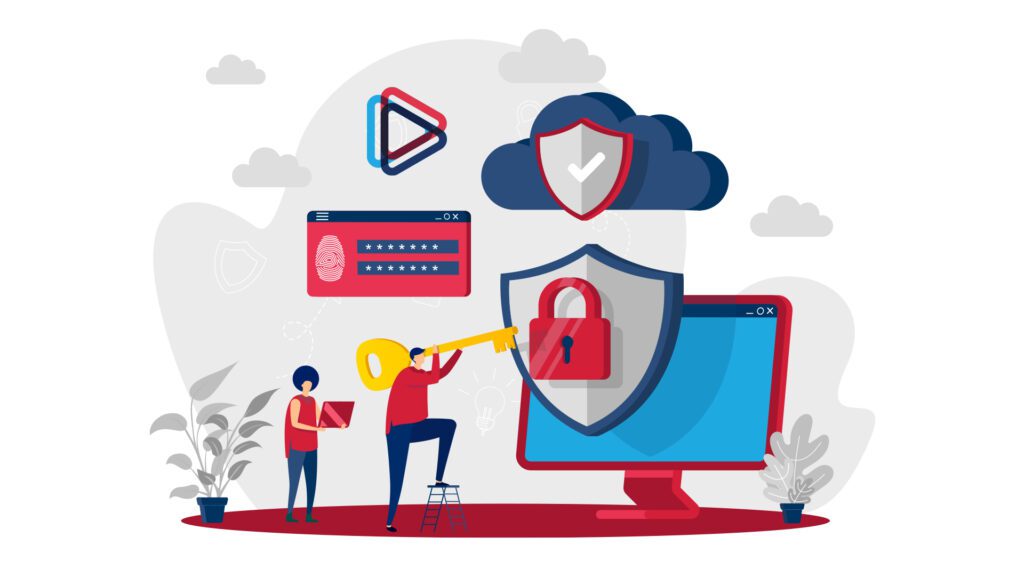Stay Protected This Cyber Security Awareness Month
How can you keep you and your family safe online? We share some of our top tips for Cyber Security Awareness Month.
How can you keep you and your family safe online? We share some of our top tips for Cyber Security Awareness Month.

October is a busy month! Between eating pumpkin pie and choosing a Halloween costume, you should also be double-checking how secure you are online for Cyber Security Awareness Month.
The theme this year is “Life Happens Online”, and that couldn’t be more true these days. With the majority of people working and connecting remotely, it’s important to take a second look at our online habits and how we communicate on our phones, computers, and tablets.
No one is immune from phishing scams. Anyone can be targeted by malicious email messages. The first step with any email is to check the sender address, so you can ensure it’s connected to a legitimate domain. Look carefully! There are often small spelling changes to try and trick email recipients.
Keep an eye out for grammatical errors in emails, as those are often a hint that the sender can’t be trusted. If you’re being asked to give private information, that’s a big red flag. It’s not best practice to share banking details, answers to security questions, or social insurance numbers via email, so companies won’t ask for this information.
If you suspect an email is malicious, avoid opening it. What happens if you’ve already opened the email? Don’t click on any links. If you receive a suspicious email at work, report it to your I.T. department. If you receive a risky email in your personal inbox, report it to the Canadian Centre for Cyber Security.
There are so many antivirus options available, it can be tricky to choose which software to get. A smart first step is making sure that the program scans for malware (which is short for malicious software). Good antivirus software should identify malware, disable those files, and delete them.
Additionally, a good antivirus program will alert you when you’re browsing a website that could infect your computer. While there are many free options out there, free isn’t always best. In fact, some free options are created by cybercriminals, who use them to install malware on your device! Make sure you stay safe and secure by researching your program options before installing anything.
It’s key to work on a private, secure network. Since a Wi-Fi network is a gateway to all of your devices, if the network is compromised, your devices could be, too. If a cybercriminal hacks your network, they will have access to your files and passwords, could run up your bill by using the Wi-Fi for their own purposes, and in the most extreme cases, could use your connection for illegal activities.
Make sure your internet router is password-protected, and make that password airtight! It should be at least eight characters, with a mix of upper- and lower-case letters and at least one number and special character.
With the holiday season upon us and the pandemic still a reality, many families will opt to buy their gifts online. To protect your data and credit card info, only shop on a secure home computer protected with antivirus software. Beware of any Cyber Monday or Black Friday deals that seem too good to be true. Make sure you only shop with online retailers that you know and trust, rather than clicking links on emails, pop-ups, or text messages.
A good practice is to always check the website’s URL. Does it have the “HTTPS” lock symbol in the address bar? This indicates that the URL has a secure connection. Do you have the correct website address—without any strange characters added? Hackers can sometimes add mistyped letters or domains like “.cc” at the end, so keep your wits about you and take your time to be wary of these tricks.
We recommend passing any lessons you learn about cyber security onto the rest of your family. Make sure your kids are using strong passwords, know how to identify suspicious messages, and feel comfortable coming to you if they spot something that seems off in their email inbox or on social media.
If your kids are into video games, we suggest having a conversation about keeping personal information private, updating games and devices to have the most recent security features and being cautious with any gaming add-ons.
Paying attention to small details can make a big difference! Explore our data privacy best practices to get more cyber security tips.
Thanks for visiting! We hope that you have found what you needed on our website. If not, please feel free to contact us using this form and we will get back to you within one business day. Tech support hours are 6:00 AM to 10:00 PM, 7 days a week.